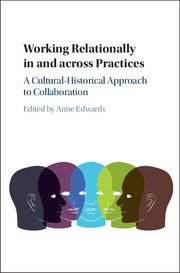Book contents
- Working Relationally In and Across Practices
- Working Relationally in and across Practices
- Copyright page
- Contents
- Notes on Contributors
- 1 Revealing Relational Work
- Part One Working Relationally in the Professions
- Part Two Working Relationally in Networks
- 8 Networked Expertise, Relational Agency, and Collective Creativity
- 9 Relational Agency and the Development of Tools in Service Networks
- 10 Creating a System of Distributed Expertise: The Oxford Education Deanery Narrative
- 11 Common Knowledge: The Missing Link in Hybrid Value Chains?
- 12 The Relational Agency Framework as a Tool for Supporting the Establishment, Maintenance, and Development of Multidisciplinary Networks of Professionals
- Part Three Working Relationally in Research
- Epilogue
- Index
- References
8 - Networked Expertise, Relational Agency, and Collective Creativity
from Part Two - Working Relationally in Networks
Published online by Cambridge University Press: 28 March 2017
- Working Relationally In and Across Practices
- Working Relationally in and across Practices
- Copyright page
- Contents
- Notes on Contributors
- 1 Revealing Relational Work
- Part One Working Relationally in the Professions
- Part Two Working Relationally in Networks
- 8 Networked Expertise, Relational Agency, and Collective Creativity
- 9 Relational Agency and the Development of Tools in Service Networks
- 10 Creating a System of Distributed Expertise: The Oxford Education Deanery Narrative
- 11 Common Knowledge: The Missing Link in Hybrid Value Chains?
- 12 The Relational Agency Framework as a Tool for Supporting the Establishment, Maintenance, and Development of Multidisciplinary Networks of Professionals
- Part Three Working Relationally in Research
- Epilogue
- Index
- References
- Type
- Chapter
- Information
- Working Relationally in and across PracticesA Cultural-Historical Approach to Collaboration, pp. 133 - 152Publisher: Cambridge University PressPrint publication year: 2017
References
- 5
- Cited by



